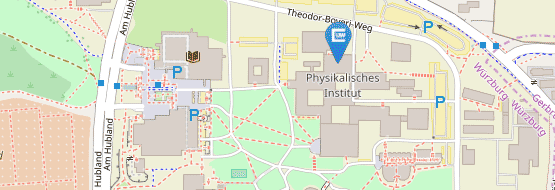Admission and Requirements
Application Periods & Deadlines
Students may start (equivalently) either in winter or in summer semester. Classes begin in either October or April, respectively. There is no application fee.
Please note, that applications can only be submitted via the WueStudy application system approximately one month before the above-mentioned deadlines.
Language Requirements and Skills
The proof of skills in the English language should be at a level not lower than:
a) Test of English as a Foreign Language (TOEFL) with at least 550 points (paper-based TOEFL) or 72 points (Internet-based TOEFL)
b) International Englisch Language Test System (IELTS) with a return of 6.0 or better
c) Cambridge Certificate in Advanced English (CAE)
In addition, German language skills (minmum A2 according CEFR) are strongly recommended. They do not have to be proven to the university officials.
Academic Requirements and Skills
Admission to the program shall be conditional on the following prerequisites (to be met cumulatively):
1. A Bachelor’s degree (180 ECTS ECTS) completed at Universität Würzburg (JMU) or another higher education institution in Germany or abroad or an equivalent German or foreign qualification (e.g. State Examination) and
2. Proof of
a) Competences on a scale totalling at least 24 ECTS from modules in the following sub-areas of experimental physics: Mechanics, electromagnetism, optics, thermodynamics, atomic und molecular physics, solid state physics, nuclear and elementary particle physics,
b) Competences on a scale of at least 22 ECTS from modules in the following sub-areas of theoretical physics: Theoretical mechanics, quantum mechanics, theoretical electrodynamics, statistical mechanics, thermodynamics,
c) Competences on a scale of at least 22 ECTS from modules in the following sub-areas of mathematics: Analysis, linear algebra, differential equations, complex analysis,
d) Competences on a scale of at least 12 ECTS from physics laboratory courses in the following sub-areas: Mechanics, thermodynamics, electrics, atomic and nuclear physics, optics, computer systems and metrology,
e) Competences on a scale of at least a further 30 ECTS from modules in the overall field of physics or minor subjects related to physics, and
f) A thesis on a scale of at least 10 ECTS on a topic from a sub-area of physics or in the case of an interdisciplinary thesis on a topic in which physics methods are essentially applied, according to the ECTS credits scheme used at JMU for the B.Sc. in Physics or – in the case of programmes not modularised within the meaning of the ECTS credits scheme – competences on the corresponding scale (as a rule acquired in the framework of the first degree indicated under Letter a)). The required competences are taught at JMU in particular in the framework of the B.Sc. in Physics (180 ECTS credits).
For further information:
Physics International - Study and examination regulations
Admission to the program shall be conditional on the following prerequisites (to be met cumulatively):
1. A Bachelor’s degree (180 ECTS ECTS) completed at Universität Würzburg (JMU) or another higher education institution in Germany or abroad or an equivalent German or foreign qualification (e.g. State Examination) and
2. Proof of
a) Competences on a scale totalling at least 29 ECTS from modules in fundamentals of nanosciences and further related basic and advanced modules,
b) Competences on a scale totalling at least 27 ECTS from modules in chemistry,
c) Competences on a scale totalling at least 27 ECTS from modules in the following sub-areas of experimental physics: Mechanics, electromagnetism, optics, thermodynamics, atomic und molecular physics, solid state physics,
d) Competences on a scale of at least 12 ECTS from modules in the following sub-areas of theoretical physics: Theoretical quantum mechanics, thermodynamics, statistical mechanics, ,
e) Competences on a scale of at least 18 ECTS from modules in the following sub-areas of mathematics: Analysis, linear algebra, differential equations,
f) Competences on a scale of at least a further 18 ECTS from physics or engineering laboratory courses or as well as industrial internships, and
g) A thesis on a scale of at least 10 ECTS on a topic from a sub-area of nanostructure technology or in the case of an interdisciplinary thesis on a topic in which methods of nanoscoiences are essentially applied, according to the ECTS credits scheme used at JMU for the B.Sc. in Nanotechnology or – in the case of programmes not modularised within the meaning of the ECTS credits scheme – competences on the corresponding scale (as a rule acquired in the framework of the first degree indicated under Letter a)). The required competences are taught at JMU in particular in the framework of the B.Sc. in Nanotechnology (180 ECTS credits).
For further information:
Quantum Engineering - Study and examination regulations


